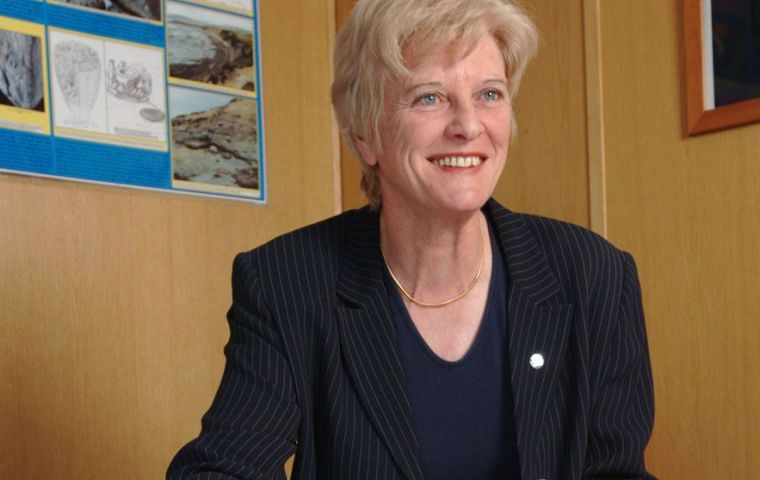MercoPress. South Atlantic News Agency
Falkland Islands: General Election with a difference
 New candidate for election: Phyl Rendell
New candidate for election: Phyl Rendell Preparations are under way in the Falkland Islands for a General Election to be held on November 7 this year and 4.30pm on October 17th marks the last moments for would be Members of the Islands Legislative Council to announce their candidacy. This year the list of candidates will be subject to particular scrutiny.
General elections in the Falkland Islands are held every four years and are generally fairly muted affairs compared with those in other countries; beyond evenly apportioned air time on the local radio (FIRS) and an equal allotment of words in the national weekly newspaper, Penguin News, there is little in the way of obvious campaigning: maybe a few leaflets in the post office to be picked up or discarded, but no posters, no loudspeaker vans touring the streets and no mass rallies of supporters.
Candidates for the eight available places on the Islands´ Legislative Council, from which the three voting members of the Executive Council are drawn, belong to no political parties, simply because in the Islands there are no political parties. In the past, also, while members received expenses for necessary travel and some remuneration for the number of meetings attended they received no salary as such and were free to devote as much or as little time to their official duties as they felt able or inclined to do. However, after the upcoming General Election all that will change.
Following the recommendations of a three-man panel chaired by former long-term Member of the Falklands´ Legislative Assembly, Richard Cockwell, which was set up to consider remuneration for Assembly Members, but also to attempt to define their future roles and responsibilities, the eight men or women chosen by the electorate this year will receive a salary, thought to be in the region of ₤40,000 per year. They will also be expected to work full-time, giving up whatever employment or business interests they might have had, for the duration of their time in office.
The aims behind this somewhat draconian change, which admits for the first time the possibility of politics as a profession in the Falkland Islands, were, in the main two-fold. One reason was the feeling expressed by previous Assembly Members that their work load had increased exponentially in recent years to the point where it left no time for other interests and activities.
Perceived in certain quarters as more urgent as the country begins to face up to a period of great change and growth with the establishment of an oil industry, was the need to attract into the Assembly, a younger, more accomplished set of candidates. With very few exceptions the only people available to stand for election in the past were the independently wealthy, the retired, or, some would claim, the impoverished and unemployable. The hope was that by offering a reasonable, but not excessive, salary not only would some status be added to the position of Legislative Assembly Member, but that it would encourage to consider standing a younger group, already successfully engaged in other careers.
While the final list of candidates has still to be published, it is mainly composed of former Members seeking re-election or former unsuccessful candidates seeking to be elected for the first time. Newcomers are few, including former senior civil servant Phyl Rendell, former lawyer Melanie Gilding and, as the only candidate under the age of thirty, Penguin News journalist and accomplished artist, Teslyn Barkman.
Richard Cockwell said that while he was pleased that his panel´s recommendations had been largely accepted, he was somewhat disappointed that the new arrangements did not appear to have made much difference to the type of person coming forward, “I had hoped”, he said, “that we would have had more than one of the up-and-coming younger generation who had benefited from the forward-thinking educational system standing.”
President of the Falkland Islands Chamber of Commerce, Roger Spink, was waiting to see how the election turned out before commenting, but ventured the opinion that he had entertained “no great hopes” that the new arrangements would “change the world immediately”, but was sure that they would have an effect in the long term.
by John Fowler - MercoPress




Top Comments
Disclaimer & comment rules-

-

-

Read all commentsPhyl Rendell makes the difference? This woman couldn't make a difference even if she wanted! haha Never power to the people, always power to the corporations haha
Oct 17th, 2013 - 02:32 pm 0I think Roger Spink is right. All in good time. In the Mother of Parliaments, it was an evolving process. But fuelled, initially, by a desire for reform and wider representation. This doesn't really seem to exist in the Falklands. As the yanks say, “If it ain't broke, don't fix it”. Just let the people decide!
Oct 17th, 2013 - 02:41 pm 0@1
Oct 17th, 2013 - 02:47 pm 0Gonzo obviously cannot read English. Phyl Rendell was a former senior civil servant, nothing to do with corporations.
Commenting for this story is now closed.
If you have a Facebook account, become a fan and comment on our Facebook Page!